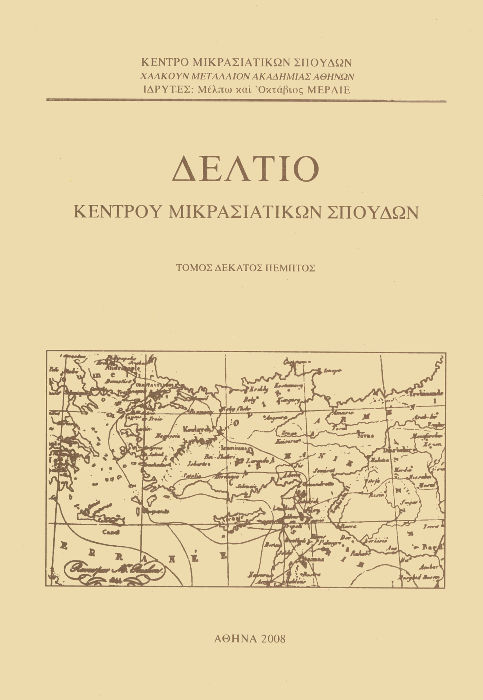Έλληνες εθνικιστές και Τούρκοι αλεβήδες
Περίληψη
This article attempts to investigate the factors and influences underlying the
widespread Greek assumption that the “heretical” Kizilbash or Alevi sect of
Turkish Muslims consists of “native Greeks” who are practising “Crypto-
Christians”. After an overview of the various cultural currents which have
historically contributed to the Kizilbash phenomenon, it is pointed out that
although Western 19th century orientalists often referred to “Christian” or
“pagan” elements in Kizilbash culture, these were usually not associated with
supposed “Greek” antecedents, but with Armenian or Indo-Iranian influences.
It is also maintained that Greek elites up to the time of the First World War
either ignored the existence of Kizilbash sects, or replicated Ottoman
attitudes condemning them as shameful “savages” or Persian “minions”.
However, the need to establish “ethnological” arguments in order to justify
Greek expansion in Asia Minor, combined with the influx of European racist
theories, and perhaps a deeper wish to rationalize long-standing but conflicting
stereotypes on the innate attributes of the Turkish “race”, led to a
sudden flow of relevant writings during the years 1918-1922, chiefly exemplified
by the work of K. Lameras and G. Skalieris. While Sunni Turks were
ceaselessly denigrated in these publications, Alevis were more or less hailed as
“enslaved brothers”, a view that was sometimes coupled with a nominal
support for an “Oriental Federation” of Balkan and Anatolian peoples. Yet
these authorities had only a tenuous acquaintance with Anatolian realities,
preferring to base their theories on doctored quotations of aging French manuals
and fanciful historical associations (e.g. the view that Turkish “Kizilbash”
is a translation of the Homeric place-name Erythinoi, or the Kurdish
tribe of Koçkiri direct descendants of medieval Paulician “Hellenism”). Their
heritage still lives on in Greek nationalist writings and encyclopedia articles,
dutifully copying their predecessors ever since the 1920s; even contemporary
academic scholarship is not, perhaps, completely above their influence. This
kind of “linear” historicism, which has also manifestly underlain Turkish
nationalist perceptions of Alevism as an Oghuz “survival”, may be dispelled
by more integrative approaches to social research.
Λεπτομέρειες άρθρου
- Πώς να δημιουργήσετε Αναφορές
-
Κοκολάκης Μ. (2008). Έλληνες εθνικιστές και Τούρκοι αλεβήδες. Δελτίο Κέντρου Μικρασιατικών Σπουδών, 15, 373–435. https://doi.org/10.12681/deltiokms.268
- Τεύχος
- Τόμ. 15 (2008)
- Ενότητα
- Άρθρα

Αυτή η εργασία είναι αδειοδοτημένη υπό το CC Αναφορά Δημιουργού – Μη Εμπορική Χρήση – Παρόμοια Διανομή 4.0.
Οι συγγραφείς των άρθρων που δημοσιεύονται στο Δελτίο διατηρούν τα δικαιώματα πνευματικής ιδιοκτησίας επί των άρθρων τους, δίνοντας στο περιοδικό το δικαίωμα της πρώτης δημοσίευσης. Άρθρα που δημοσιεύονται στο Δελτίο διατίθενται με άδεια Creative Commons 4.0 και σύμφωνα με την άδεια μπορούν να χρησιμοποιούνται ελεύθερα, με αναφορά στο/στη συγγραφέα και στην πρώτη δημοσίευση για μη κερδοσκοπικούς σκοπούς και με δικαίωμα τροποποίησης μόνον με παρόμοια διανομή (αν αναμείξετε, τροποποιήσετε, ή δημιουργήσετε πάνω στο υλικό, πρέπει να διανείμετε τις δικές σας συνεισφορές υπό την ίδια άδεια όπως και το πρωτότυπο).


